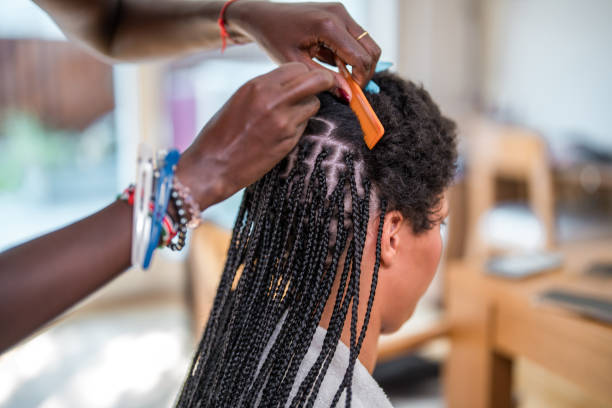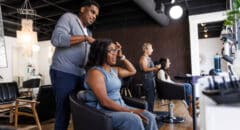
Let’s be real — doing our hair is not just about looking good. It’s therapy. It’s tradition. It’s the switch-up we need after a long week, a breakup, or just because. Whether it’s 30 inches of bone-straight, a fresh silk press with that “don’t touch it” bounce, or knotless braids that took all day but will last all month — our hair is us.
Now imagine this: you walk into the beauty supply store for your usual — a few packs of braiding hair, maybe a bundle deal, or some wig glue — and suddenly everything is more expensive. Like, way more expensive. Not because the brand changed. Not because it’s better quality. But because of something called… tariffs?
Yep. Some decisions being made in Washington could raise the price of imported hair — and if that happens, the cost of getting your hair done might skyrocket. And let’s be honest: we already spend enough on our hair to keep the whole economy alive.
Here’s what’s really going on, why it matters, and how it could affect you, your stylist, and every Black-owned beauty business in between.
The Hair That Crosses Oceans
The U.S. imports the vast majority of its hair — both human and synthetic — from countries like China, India, and Indonesia. These imports make up everything from $40 braiding hair packs to $400 virgin bundles. According to the U.S. International Trade Commission, China alone supplies more than 75% of synthetic hair products sold in the States.
If tariffs are increased — as part of ongoing trade tensions or to prioritize domestic manufacturing — the cost of importing these products could rise sharply. That cost would almost certainly be passed on to consumers, salon owners, and small Black-owned beauty supply businesses that already operate on thin margins.
From the Chair to the Checkout
Hair isn’t a trend for us — it’s a lifestyle. It’s how we show up in the world, how we protect our peace, and often how we save time. Braids that last for weeks. Wigs that switch up the vibe. Ponytails that pull it all together.
But if tariffs kick in, that $10 pack of braiding hair might jump to $14. A $300 wig could become $375. For stylists and everyday women alike, that means stretching styles longer or cutting back on quality — just to keep up.
“Hair is healing for us. It’s how we connect to each other and express ourselves,” says Alicia Brown, a stylist and salon owner in Atlanta. “But if the cost of hair goes up, people might have to choose between a style that makes them feel good and paying a bill.”
And that’s not just frustrating — it’s unfair.
The Ripple Effect on Black Businesses
Let’s be real: the Black community has built the beauty industry. Yet, Black entrepreneurs often get the smallest piece of the pie. Many stylists, braiders, and online hair sellers depend on imported hair to survive. If those costs shoot up, their profits shrink or disappear entirely.
“It’s already hard enough for us to get shelf space and startup capital,” says Monique Jefferson, owner of a natural hair care brand. “Now we might be competing with big companies that can absorb the extra costs while we’re struggling to stay afloat.”
Higher tariffs could also hurt salon clients — especially students, moms, and working women who rely on affordable protective styles to stretch their dollars and their time.
Why We Need to Pay Attention
Tariffs might sound like something that only affects big corporations, but the impact hits close to home — at the beauty supply store, in the braid shop, and in our bank accounts.
This is about more than bundles. It’s about protecting access, affordability, and the businesses that know our hair better than anyone else.
What You Can Do
-
Support local and Black-owned beauty businesses that offer competitively priced products and services.
-
Stay informed about changes in import laws and tariffs. Knowledge is power.
-
Speak up — call your representatives and advocate for trade policies that consider how tariffs affect Black communities and small businesses.
-
Explore alternative sources — look into U.S.-based or Black-owned hair suppliers who may be less affected by global shifts.
At the end of the day, our hair is sacred. Let’s protect it — and the economy we’ve built around it — from policies that weren’t made with us in mind.








